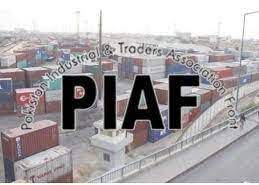PIAF chief urges commerce ministry, traders to take advantage of CPEC

Lahore: Pakistan Industrial and Traders Associations Front (PIAF) Chairman Faheemur Rehaman Saigol has proposed to the Pakistani commerce ministry to devise strategies for promotion of Pakistani products, calling upon trade officers to take advantage of opportunities offered by China-Pakistan Economic Corridor (CPEC).
Raising grave concern over the continued falling trend of Pakistan exports the PIAF chief said that the country’s textile exports dipped for the fifth consecutive month as shipments dropped by almost 30% year-on-year to $1.20 billion in Feb 2023, indicating that the government has failed to win the confidence of the business community due to continued rupee deprecation and uncertainty.
Quoting the latest figures, he stated that the overall exports during July-February 2022-23 totalled $18.678 billion against $20.57 billion during the corresponding period of last year, showing a decrease of 9.21 percent while the exports in Feb 2023 were $2.19 billion compared to $2.24 billion of Jan 2023 showing a decrease of 2.36 percent and by 22.69 percent respectively.
According to a statement on Sunday, the PIAF Chairman pointed out that administrative measures to curb imports, leading to raw material shortage for the industry and resultantly lower production, were the main reason for the plunge while the slowdown in global demand amid monetary tightening was another reason.
Saigol said that Pakistan has remained a potential market for foreign investors, who still have plans to make fresh investment in the country, but they have continued to wait for the return of economic stability.
He highlighted uncertainty in the rupee-dollar parity as one of the major concerns of foreign investors. He said a slowdown in the economy had badly impacted business confidence. It is must for the authorities concerned to first create an enabling environment for the local businessmen desiring to make new investment.
Data shows that textile exports came in at $1.2 billion in February, down 11% month-on-month (MoM) however, in rupee terms, exports came in at Rs315 billion, up by 2% MoM.
Value-added textile exports decreased by 13% MoM to $812 million mainly due to lower shipments of readymade garments and knitwear, which declined by 13% and 18% MoM respectively, he said. Towels and bed wear exports decreased by 8% and 7% MoM respectively, according to Malik. Basic textile exports registered a decline of 8% MoM to $214 million in February 2023. In terms of volume, knitwear, towels and bed wear shipments decreased by 16%, 10% and 9% MoM respectively, whereas exports of readymade garments increased by 15% MoM. According to data, among basic textiles, cotton yarn exports were down by 22% MoM whereas cotton cloth shipments were up 11% MoM. Pakistan’s value-added segment declined on a Year-on-Year (YoY) basis by 26%, 34% and 28% in the categories of bed wear, knitwear and readymade garments respectively.
Textile exports declined mainly due to import restrictions, resulting in unavailability of raw material, coupled with global recession which kept textile demand subdued, he said. Besides domestic issues, there are global reasons as well for the decline in exports that have also impacted other countries.
In the first eight months of current financial year (8MFY23), Pakistan recorded textile exports of $11.22 billion, down by 11% YoY, while in rupee terms, they were up by 19% YoY, while exports of basic and value-added textile declined by 21% and 9% YoY respectively.
Demand from major markets, such as the US and Europe, was the key concern among textile exporters, he said. Furthermore, the recent hike in electricity tariffs will pose a challenge to the sector.
On a year-on-year basis, cotton yarn exports registered 56.65 per cent negative growth, while on a MoM basis, it registered 18.09 per cent growth.
Rice exports declined by 12.09per cent during the first eight months of 2022-23 and remained $1.354 billion compared to $1.540 billion during the same period of the last fiscal year.
The PIAF Chairman advocated the need for raising the country’s tax base so that tax-to-GDP ratio improves from current poor level.
He urged the trade officers to explore opportunities to diversify exports of goods and services in their respective areas, asking them to meet the challenges faced by Pakistan in European markets.





